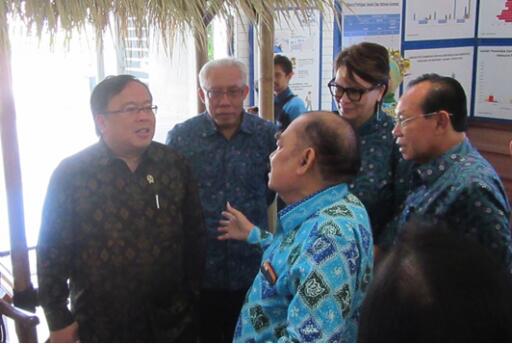JAKARTA, Indonesia; 31 July 2017: At the World Population Day 2017 commemoration, speakers stressed that rights-based FP is needed for population development that enhance the wellbeing of families and communities and their productivity in order to boost the country’s competitiveness, secure continued economic growth and ensure development sustainability.
The world’s population is getting older. In Indonesia, although elderly population is increasing but its productive-age group is still a large portion of the country’s total population.
“Population policies at national & subnational level should consistently focus on improving the quality of life, increasing income and strengthening economic growth. Such policies should be formulated in a way that is suitable with local population characteristics,” said Minister for National Planning Board Bambang Brodjonegoro.
FP, he added, is proven to improve weĺlbeing of individuals, women & children, families & communities. FP investment is needed and such investment is more effective when coupled with investment for maternal healthcare.
At the 11 July London FP Summit, Indonesia’s high level representatives expressed commitment to maintaining quality FP services to more than 30 million current users and ensuring accessibility to at least 2.8 million additional users. GoI will allocate USD 1.6 billion for FP programs between 2015 and 2019; this includes an almost two-fold increase in budget allocation from 255 million in 2015 to 458 million in 2019. Efforts are also conducted to ensure FP inclusion in Universal Health Coverage by 2019; improved Contraceptive Method Mix; availability, quality supply chain management of contraceptive commodities; empowerment of young people; and integrated approach to rights-based family planning programming at the sub-national level.
UNFPA Representative Dr. Annette Sachs Robertson commended Indonesia’s strong commitment to upholding the rights to FP. “FP programme will harness demographic dividend, ensuring improvements in health, school & labour force participation, greater productivity and eventually increased income, savings and investment and asset accumulation,” she explained.
Demographic dividend is a period of low dependency ratio, when the non productive age group is lower than the productive age group.
Head of the National Population and Family Planning Board (BKKBN) Surya Chandra Surapaty shared a similar view and emphasized that FP programme is still a priority for sustainable development. To improve population policies, he said the use of population data should be promoted so that population policies & initiatives answer to the need and address population challenges. “All of us should be active FP advocates,” he urged the seminar participants.
A sociologist from the University of Indonesia Imam Prasodjo said that population development to boost productivity for accelerated long term development requires strong cross sectoral partnership, especially between BKKBN, MOH, MOWECP and between national and subnational administrations. There is a need to build FP network for enhanced resourcefullness of individuals, families and communities. “Parental role is crucial and community participation should be mobilized towards youth empowerment. We need to build a community responsive to youth empowerment. Their empowerment helps prevent social problems,” Imam said.
Parents, he added, need to develop awareness on rights-based FP and parental responsibility. “It’s not just about the number of the children but also their responsibility for the wellbeing and the good upbringing of their children.”


